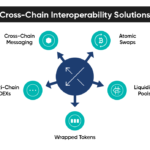
The DeFi (Decentralized Finance) ecosystem has already showcased its transformative power, enabling peer-to-peer financial services without traditional intermediaries. The focus is shifting towards institutional adoption, with public blockchains at the forefront.
Despite early hesitations, institutions are increasingly recognizing the transparency, security, and operational efficiencies that public blockchains offer, potentially revolutionizing their participation in DeFi.
The Promise of Public Blockchains in DeFi
Public blockchains are inherently decentralized and transparent, making them ideal for building trust within the DeFi ecosystem. Unlike permissioned blockchains often preferred by enterprises due to their controlled access, public blockchains offer open access, allowing anyone to audit, verify, and participate. This transparency is essential for institutional players that require clear audit trails to meet compliance requirements.
Moreover, the programmability of public blockchains enables the creation of complex financial products without intermediaries, which reduces costs and enhances operational efficiency.
By leveraging smart contracts, institutions can automate various financial transactions such as loan issuance, collateral management, and settlements. These characteristics make public blockchains a compelling choice for DeFi, and they continue to evolve to better meet institutional needs.
Advancements in Blockchain Interoperability and Layer 2 Solutions
Public blockchains like Ethereum, which supports the majority of DeFi applications, have faced issues with high gas fees and transaction delays, particularly during periods of peak activity.
To address this, Layer 2 solutions such as Optimistic Rollups and ZK-Rollups have been developed. These solutions allow transactions to be processed off-chain and then recorded on the main chain, resulting in significantly reduced transaction costs and faster processing times.
Additionally, interoperability protocols such as Polkadot, Cosmos, and Chainlink’s Cross-Chain Interoperability Protocol (CCIP) are helping public blockchains connect and work together. For institutions, the ability to transfer assets and information seamlessly across blockchains is crucial. This interoperability enhances liquidity and allows for diversified asset management across multiple blockchain networks.
Regulatory Developments Encouraging Institutional DeFi
Regulatory clarity is essential for institutional adoption, as financial institutions must operate within a well-defined legal framework. Governments and regulatory bodies worldwide are showing a growing interest in DeFi, with many working on legal frameworks that balance innovation and investor protection.
For example, the European Union’s Markets in Crypto-Assets (MiCA) regulations aim to standardize digital asset regulations across EU member states, making it easier for institutions to enter the DeFi space.
In the United States, there has been progress with frameworks like the Responsible Financial Innovation Act, which seeks to create a regulated pathway for blockchain applications. As regulatory clarity grows, more institutions will likely be encouraged to adopt DeFi solutions on public blockchains.
Security and Institutional Grade Custody Solutions
Another major concern for institutions considering DeFi is the security of public blockchains. Recent developments in cryptographic technologies, such as Zero-Knowledge Proofs (ZKPs), Multi-Party Computation (MPC), and advanced custodial solutions, have significantly bolstered security within DeFi ecosystems.
Custody solutions provided by companies like Anchorage, Fireblocks, and BitGo are now able to meet institutional standards, offering insurance and additional protections that reduce risk.
The Path Forward for Institutional DeFi
The convergence of public blockchain technology with advancements in interoperability, security, and regulatory compliance is positioning DeFi as a viable financial solution for institutions.
As public blockchains continue to develop, they will provide the secure, transparent, and scalable infrastructure that institutional investors need to engage in DeFi confidently.
The public blockchain ecosystem’s expansion signals a promising future where traditional finance and decentralized finance coalesce, ultimately leading to a more inclusive global financial system.
For institutional investors ready to explore the potential of DeFi on public blockchains, staying informed on the latest developments is key. Stay updated with Kenson Investments—our team of digital asset specialists provides insights and support to navigate this evolving landscape and help you make informed investment decisions in the digital asset space.DeFi














